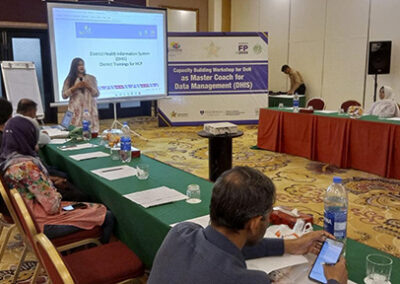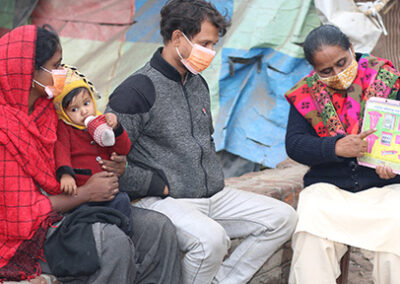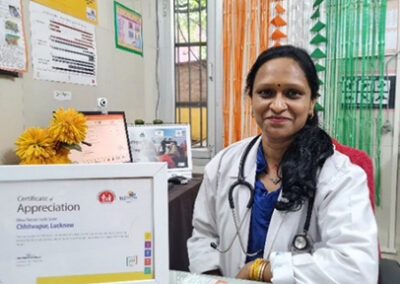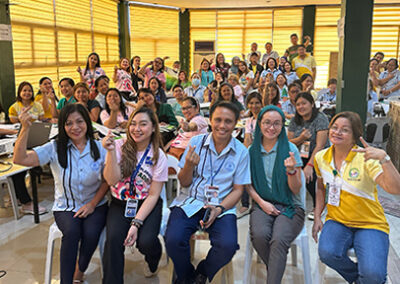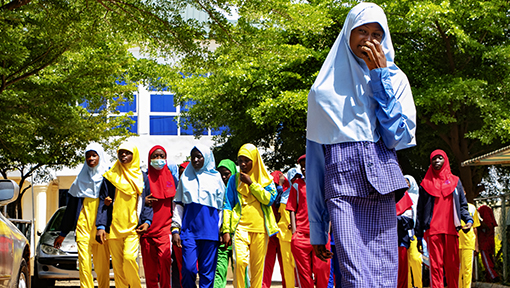
Students walk to their classes in Ogun State, Nigeria.
Although evidence exists showing well-designed and well-implemented adolescent and youth-friendly health services (AYFHS) can help increase access to and use of contraception, traditional models of specialized service delivery for adolescents have proven difficult to sustain and scale (High Impact Practices in Family Planning (HIPs) 2021). As a result, The Challenge Initiative (TCI) in Nigeria sought to address this challenge by adapting existing health services’ supportive supervision structures to provide quality AYFHS and contraceptive services with ongoing quality improvement (QI) activities.
Findings from a recently published program case study in the Global Health: Science and Practice journal from four Nigerian states – Edo, Niger, Plateau and Ogun – reveal it is possible to integrate and improve AYFHS within a systems-based approach. TCI supported the state governments in Nigeria by updating the already existing family planning supportive supervision (FPSS) tool that the Nigerian government had previously endorsed for AYFHS, leveraging the WHO’s Regional Office for South-East Asia (SEARO) AYFHS checklist and Nigeria’s National Standards & Minimum Service Package for Adolescent & Youth Friendly Health Services. To ensure that the quality of family planning (FP) service delivery aligned with the national FP service protocol and facilitate improvement in the quality of service delivery, state government staff conducted supportive supervision activities using the updated FPSS QA tool at the health facilities.
TCI supported the State Ministry of Health’s Adolescent Health and Development unit and the State Primary Health Care Development Agency to identify and select 130 high-volume sites (HVS) (primary health centers) across 25 urban local government areas (LGAs) in the four states to implement AYFHS QI interventions. The interventions implemented included enhancing supportive supervision using a modified FPSS QA checklist to provide facility-level coaching and whole-site orientation, strengthening provider capacity in AYFHS at facilities through training and mentoring, and strengthening adolescent and youth (AY) demand for contraceptive services.
What did we learn?
- Repeated rounds of the modified FPSS tool-driven QA process showed improvements in the quality of AYFHS provided to AY at the 130 HVS.
- Although TCI was unable to assess the relative contributions of facility-level QI processes vis-à-vis the community-level demand generation activities toward increases in contraceptive uptake by AY, the results highlight that a combined demand generation and service delivery approach, anchored in the regular administration of the QA checklist at scale, improved the quality of AYFHS and contributed to the increase in contraceptive uptake by AY.
- There was a difference in improved quality and increased uptake across the 4 states, which reveal the importance of the baseline health system maturity level of each state in delivering quality family planning services before intentionally integrating AYFHS as well as the different timelines of intervention implementation across the 4 states.
Ultimately, findings from this program case study show that it is possible to integrate an AYFPSS QA tool and its associated QI processes within an existing health system’s supportive supervision checklist, with the relevant support for enhanced capacity to administer, analyze and translate the findings into action through performance improvement plans. The simplified checklist accompanied by capacity strengthening in the form of coaching, whole-site orientation and on-the-job training can positively impact the quality of AYFHS, as supported by client exit interview responses that reported satisfaction with services received from facilities that scored green (i.e., meeting quality standards). Unfortunately, the lack of client feedback from poorer-performing facilities (scoring yellow and red) did not allow a comparison of client perceptions of poorer service quality. As a result, the authors said more research is recommended to ascribe causality, but early signals point to this approach being impactful, scalable and sustainable through existing government systems and structures.
Improving the Quality of Adolescent and Youth-Friendly Health Services Through Integrated Supportive Supervision in 4 Nigerian States was written by , , , , and

